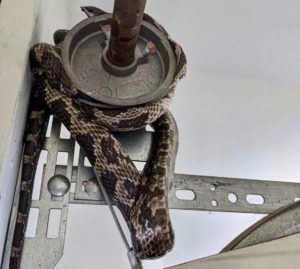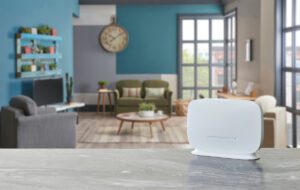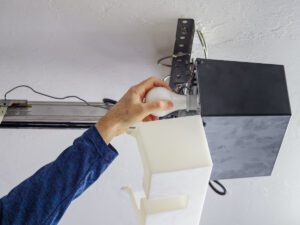
What Should I Do If My Garage Door Is Opening By Itself?
There are a variety of reasons that your garage door could be opening without your consent. Figuring out the source of the issue is a matter of troubleshooting what is wrong with your door operating system. Some of these issues will require the help of a professional, while others can be fixed easily by yourself, which can save money. This post will give you an overview of the most common causes of a garage door opening by itself and the solutions.
When your garage door begins acting up, it can cause a huge disruption in your day-to-day life. If you have a garage door that opens up on its own and you can’t find the cause, it’s time to call in a professional. At Overhead Door Company of Huntsville/North Alabama™, we’re ready to fix any issues with your garage door to get it working. We service and repair all brands.
Call Us to Schedule Your Service
Possible Problem #1
A remote transmitter or button is stuck or is otherwise repeating its signal.
Explanation
The components involved in opening your garage door may wear down over time from regular use. One of the most common results of this is the physical buttons involved in opening your garage door becoming stuck. Usually, these are the devices you use to tell your garage door to open. Devices this can affect include car remotes, wall buttons, keypads, and other similar gadgets. When a button on one of these tools gets stuck, it can cause a signal to repeat itself, making the door repeatedly open and close by itself.
What To Do
Try replacing the batteries in your remote.
Check all your garage door opening devices to see if any buttons are stuck. If a remote controller has a stuck button, take its batteries out to disable the device until you can replace it. If it’s a wall-mounted button, you should unplug your garage door opener until you can get it fixed.
Get in touch with us if you need a service call.
Faulty Wall Button: A malfunctioning wall-mounted control button can send unintended signals to the garage door opener, causing the door to open unexpectedly. Inspect the wall button for any visible issues.
Possible Problem #2
Remote Control Reprogramming
If your remote transmitter or garage door opener is not properly programmed or has been reset, it can lead to issues where the door opens unexpectedly.

Possible Problem #3
There is an issue with the electrical circuits, the circuit board, or a faulty wiring issue.
Explanation
When your garage door opens and closes, there is a lot of vibration and shaking. Over years of daily use, these violent movements can cause a wire involved in opening your garage door to become loose. Power surges and outages can also cause this issue. Wires that are not appropriately connected can short circuit, which can cause a variety of issues. One of the possible problems this can cause is the door repeatedly opening and or closing itself.
If you’ve recently experienced a power outage or surge, it may have damaged the electrical circuits that are responsible for opening and closing your garage door. This type of damage can lead to the garage door opening on its own — usually in a completely erratic manner.
The garage door circuit board, or logic board, helps operate the entire garage door. Sometimes this circuit board goes bad.
In your garage, a wire runs from the motor unit to the opener that’s mounted to your wall. Some wires run between the motor unit and each sensor on either side of the garage door tracks, near the floor. If any of these small-gauge wires have a bare spot or a short circuit, it could be the reason your garage door keeps opening on its own.
What To Do
Due to the open-ended nature of this issue, you should call a garage door technician to inspect the circuits. If you suspect recent weather conditions or other power surges, either of these may be at the root of your garage door opening on its own.
Look for evidence of a broken or chewed wire. This sometimes happens when a staple punctures the wires, a rodent might have been chewing on the wires, or a simple mistake of a shovel or sharp instrument piercing the wires.
Call us to do an inspection and make the repairs needed to get your garage door functioning normal again.
Possible Problem #4
Your remote transmitter or garage door runs on the same frequency as your neighbor’s.
Explanation
Older garage doors, which more commonly face this issue, communicate with garage door openers on a narrow range of frequencies. There is a slight chance that yours is the same as your neighbors, which causes miscommunication between your garage doors and openers. This problem only occurs in older garage door openers that were programmed using positioning clips. It is rare for a remote transmitter to pair with the wrong door in newer models, but it is still possible.
What To Do
An easy way to verify this issue is to ask your neighbors to open their garage doors. When theirs opens, does yours too?
If you own a newer garage door, you may own an LCD control panel, in which case you can check it to see who is connected. If you find more than the ones you use, you’ve found the issue. To fix this issue, you will need to reprogram your remote transmitter, or your garage door will need to be set to a different frequency.
Each garage door opener manufacturer has a different way of reprogramming and/or switching its frequency. Reach out to us to make sure your frequencies and codes are correctly set.

Possible Problem #5
Debris is preventing your garage door from closing.
Explanation
Garage doors have a safety mechanism to detect if something is below it, preventing it from properly closing. Debris that builds up at the base of a garage door over time, such as rocks, sticks, or even just too much dirt, can cause the door to not close.
What To Do
Most all garage doors have a safety feature known as a reversing mechanism. If you don’t have this system in place, this is reason enough to call us! These sensors are located near the floor of your garage, right where the door closes. These sensors are designed to keep people and belongings safe from being crushed by the door. When these sensors detect something in the way, it reverses the closing motion of the door, opening it again. Something as simple as a spider web might cause your garage door to not close.
Make sure the area surrounding your garage door is free of debris to ensure that the safety mechanism does not kick in.
Another consideration. Look up! You might find something up inside the coils of the springs keeping it from closing. It’s not uncommon for a snake or rodent to become trapped as the door begins to close.

A snake coiled up in the cable of a garage door in Huntsville, Alabama – summer 2021. Garage door sensors can be knocked out of alignment causing a garage door to reopen before it shuts. The garage door might reverse and open on its own for seemingly no reason or not work at all if the sensor fails. Dirt on the lens is a common issue, but it’s also possible for a sensor emitter or receiver, or both, to go out of alignment. Something as simple as a snake or rodent can cause this. Unfortunately, in this case, the sensors were knocked out of alignment causing the door to reverse before closing – thus trapping the snake.
Possible Problem #6
Misaligned Safety Sensors are Preventing Garage Door from Closing Correctly
Explanation
If you have ruled out Possible Problem #5, but your door is still experiencing exhibiting the same issue of closing partially, then opening back up, this is likely the issue. Most garage doors use two thermal sensors to verify if anything is in the way. If one or both sensors become offset, then the garage door will not close.
What To Do
Verifying whether you have thermal sensors or not is easy; thermal sensors would be located at the bottom of the two rails that the garage door slides on, facing each other. An orange LED should be visible on one of the sensors; this is the sending sensor. The other sensor, the receiving sensor, has a green LED, which will be in one of four states: solid, flickering, dim, or completely off. The amber LED on the sending sensor will glow regardless of alignment or obstruction. If the LED is not producing a solid green color when unobstructed, it means that your thermal sensors are misaligned. These are referred to as photo eyes. These sensors must be connected and aligned correctly for the garage door to work properly.
If this is the case, you should contact a professional garage door technician.
Understanding Garage Door Safety Sensors

Possible Problem #7
Limit Settings are Set Incorrectly or Malfunctions
Explanation
The limit switch on a garage door opener prevents the erratic movement of a garage door, acting as a safety instrument that keeps the door from accidentally closing on someone and causing accidents and severe injuries. This setting is essential for a garage door opener to instruct the door to stop while operating.
If the limit switch is set incorrectly or malfunctions, the door may refuse to close fully close. In some cases, it will reverse after fully closing.
What To Do
Adjust either the up or down limit switch or both, depending on the issues faced while opening or closing.
- The up-limit knob needs adjustment if the door opens halfway or doesn’t open fully.
- The down limit switch requires adjusting when the garage door doesn’t close entirely or stops mid-way.
If you suspect your limit settings may be the cause of your garage door opening issues, schedule your appointment today for us to adjust and reset your current settings. If the limit switch isn’t working, it won’t tell your garage door to stop when it senses an object in the way. The limit settings on a garage door opener can be extremely dangerous if not set correctly.
Attempting to adjust the limit settings on your garage door operating system without the necessary knowledge and experience can be dangerous for several reasons:
- Risk of Injury: Garage doors are heavy and operate under tension. Trying to adjust limit settings without proper training and tools can lead to accidents and injuries. You may get your fingers caught in moving parts, be struck by the door, or suffer other injuries.
- Damage to the Door: Incorrectly adjusted limit settings can cause the door to close too forcefully, leading to damage to the door itself, its components, or items in its path. This can result in costly repairs.
- Safety Sensors Bypass: Adjusting limit settings improperly may cause the garage door opener to bypass its safety sensors. These sensors are essential for preventing the door from closing on people, pets, or objects in its path. Disabling or bypassing these sensors can create serious safety hazards.
- Unpredictable Behavior: Garage door openers are designed to operate within specific parameters. Changing the limit settings without a proper understanding of the door’s mechanics and the opener’s capabilities can lead to unpredictable and erratic behavior of the door, including sudden reversals or failure to stop when needed.
- Voiding Warranty: Many garage door openers come with warranties. Attempting DIY adjustments may void your warranty, leaving you responsible for any future repairs or replacements.
- Lack of Expertise: Garage door systems can be complex, and adjusting limit settings requires a good understanding of how the system works. Professionals are trained to make precise adjustments based on the door’s weight, size, and other factors.
- Electrical Hazards: Garage door openers are powered by electricity. Incorrect adjustments can lead to electrical hazards, including short circuits, shocks, or damage to the opener’s electrical components.
To ensure the safety and proper functioning of your garage door system, it’s best to leave limit setting adjustments and other complex maintenance tasks to trained and experienced garage door technicians. These professionals have the expertise and equipment necessary to make precise adjustments safely and effectively. Prioritizing safety when it comes to garage door maintenance is essential for preventing accidents and ensuring the longevity of your system.
Possible Problem #8
Weather Conditions
Extreme weather conditions, such as lightning strikes or power surges during storms, can disrupt the garage door opener’s operation and lead to unintended door openings.

Possible Problem #9
Remote Control Cloning or Hacking
The percentage chance of a person being able to clone a signal from a modern, rolling-code garage door remote on a new opener is extremely low. Modern garage door openers use advanced security features to minimize the risk of signal cloning and unauthorized access.
Remote control cloning or hacking can potentially cause a garage door to open on its own. Remote control cloning or hacking refers to the unauthorized duplication or manipulation of the signals used by a garage door opener’s remote control. Here’s how it can lead to unintended garage door openings:
- Signal Cloning: If an individual gains access to the code or frequency used by your garage door opener’s remote control, they can clone the signal. This means they can effectively replicate your remote control’s signal, allowing them to send a command to open your garage door without your consent.
- Rolling Code Vulnerabilities: Some older garage door openers use fixed codes for their remote controls, which are more vulnerable to cloning. However, even modern garage door openers with rolling code technology, which generates a new code for each use, may have vulnerabilities if the code is intercepted and reproduced.
- Hacking Wireless Communications: Sophisticated attackers might attempt to hack the wireless communication between the garage door opener and the remote control. If successful, they could send unauthorized commands to open the garage door.
To prevent remote control cloning or hacking, consider these security measures:
- Use a garage door opener with rolling code technology, which is more secure than fixed-code systems.
- Regularly update your garage door opener’s firmware to patch any known vulnerabilities.
- Secure your garage door remote control and keep it out of sight when not in use.
- Enable two-factor authentication, if available, for your garage door opener’s control app or system.
- Change your garage door opener’s access code periodically.
- Ensure your Wi-Fi network is secure, as some smart garage door openers rely on wireless connections that could be vulnerable to hacking.
If you suspect that your garage door remote control has been cloned or that someone has unauthorized access to your garage door opener system, it’s crucial to take immediate action. Change the access codes, reset your remote control, and consult a professional technician to enhance the security of your garage door opener.

Possible Problem #10
Interference
Smart home devices, when properly configured and secured, should not cause a garage door to open on their own. Garage door openers are designed with built-in security features to prevent unauthorized access and accidental openings. However, there are a few potential scenarios where smart home devices could affect garage door operation:
Smart Home Devices Interference: If you have integrated your garage door opener with a smart home system, occasional glitches or interference with other smart devices on the network could result in unexpected garage door activations.
The likelihood of your Wi-Fi interfering with your garage door opener is quite low, unless you have an exceptionally robust home Wi-Fi system that doesn’t require further explanation – the type that can provide coverage over an extended area.
However, potential sources of interference can include unshielded electronic devices situated near the garage door opener, such as inexpensive freezers, power tools, breaker boxes, or electric car charging stations, whether located inside the garage or in nearby rooms.
Other factors that might disrupt the remote control signal include the replacement of street or car lights with LED alternatives, neighbors upgrading to newer garage door openers, or the introduction of new electronics in vehicles – either due to the installation of a new stereo system or CB radio, or because you acquired a new car.
External interference, including electromagnetic interference (EMI), can potentially disrupt the normal operation of a garage door opener, but it is highly unlikely to directly cause a garage door to open on its own. Garage door openers are designed with safety mechanisms and specific coding to prevent accidental or unauthorized openings. While this is relatively rare, it’s important to be aware of the possibility and take steps to prevent it. Here’s what you can do:
1. Identify Potential Sources of EMI:
- Locate nearby electronic devices, appliances, or equipment that might emit electromagnetic interference. Common sources include large appliances, cordless phones, Wi-Fi routers, electronic transformers, and even fluorescent lighting.
2. Relocate or Shield EMI Sources:
- If possible, relocate EMI-emitting devices away from the garage door opener or its control unit. Increasing the distance between the opener and potential sources of interference can help reduce the likelihood of disruption.
3. Use Shielded Cables and Components:
- Consider using shielded cables for the wiring of your garage door opener system. Shielded cables can help minimize the effects of electromagnetic interference. Ensure that the garage door opener unit itself is properly shielded if necessary.
4. Check for Radio Frequency (RF) Devices:
- Some electronic devices operate on radio frequencies that can interfere with garage door openers. Be aware of any RF devices in your vicinity, and if possible, switch them to a different frequency or turn them off when not in use.
5. Install a Surge Protector:
- Install a surge protector or line filter to protect the garage door opener from voltage spikes and electrical interference that can occur during power surges or fluctuations.
6. Update and Secure Wireless Devices:
- Ensure that all wireless devices in your home, such as Wi-Fi routers and cordless phones, are operating on their respective frequencies and are updated with the latest firmware to minimize interference.
7. Consult a Technician:
- If you continue to experience interference-related issues despite taking these preventive measures, consult a professional garage door technician. They may be able to install additional shielding or recommend specific solutions based on your situation.
8. Opt for Opener with Advanced Security Features:
When choosing a garage door opener, consider models equipped with advanced security features, such as rolling code technology. Rolling code technology changes the remote control code with each use, making it highly resistant to interference.
While external interference causing garage door opener issues is relatively uncommon, taking proactive steps to prevent potential sources of EMI and ensuring your opener system is well-maintained can help reduce the risk of unintended door openings. If you encounter persistent problems with interference, a professional technician can provide tailored solutions to address the issue effectively.
Here’s how external interference might affect a garage door opener:
- Signal Interference: EMI or other external interference could disrupt the radio signals used by the garage door opener’s remote control or wall-mounted button. This might result in delayed responses, missed signals, or unintended door movements, such as the door not responding to a command or reversing its motion unexpectedly.
- Safety Sensors: Garage doors are equipped with safety sensors near the floor on either side of the door’s path. These sensors emit an infrared beam. If something obstructs this beam, the garage door opener interprets it as an obstacle, preventing the door from closing. EMI could potentially interfere with the sensors’ operation, causing the door to reverse or remain partially open, which might give the appearance of the door “opening” by itself.
- Remote Control Activation: In rare cases, external interference could inadvertently trigger a remote control or wall-mounted button, leading to the garage door operating, either opening or closing.
While these scenarios are possible, they are uncommon. Garage door openers are engineered with safety as a top priority and are designed to resist most forms of external interference, including EMI. Additionally, modern garage door openers often use rolling code technology to enhance security, making it highly unlikely for random interference to open the door.
If you suspect external interference is affecting your garage door opener, it’s essential to investigate and address the source of the interference to ensure the safe and reliable operation of your garage door system. Consulting a professional garage door technician can help diagnose and resolve any interference-related issues.

Alert: Ordinary LED and CFL bulbs can produce interference that reduces the effectiveness of garage door remotes. While most LED bulbs operate at frequencies around 300 MHz, garage door openers function at frequencies around 360 MHz. These differing frequencies can interfere with or overlap each other, resulting in various issues.
The Overhead Door™ LED garage door opener light bulb has been specifically designed and tested to reduce or eliminate remote interference with most garage door openers. It’s a light bulb that is specifically designed to use in a garage door opener unit. This light bulb is shatter resistant and vibration resistant (withstands 5G force!) and has been cold weather tested to -30ºC. These can be ordered online or you can find the equivalent version (Genie) at your local big box stores. These bulbs stand out as the top-performing and most universally compatible light bulb for garage door openers. Meticulously crafted and rigorously tested, it has been tailored for use with all brands of garage door openers, offering minimal to no radio frequency (RF) interference. We highly recommend these bulbs.
What is the difference between EMI and Wifi
Electromagnetic Interference (EMI) and Wi-Fi (Wireless Fidelity) are two distinct concepts related to the transmission and reception of electromagnetic signals, but they serve different purposes and have different characteristics:
- Electromagnetic Interference (EMI):
- Definition: EMI refers to the disturbance or interference that occurs when electromagnetic signals from one device or source disrupt the normal operation of another device or system.
- Cause: EMI can be caused by various factors, including electronic devices, power surges, radiofrequency interference, and other sources of electromagnetic radiation.
- Impact: EMI can disrupt the proper functioning of electronic equipment, causing data errors, signal degradation, or even complete system failure. It can affect a wide range of devices, including radios, TVs, computer systems, and medical equipment.
- Prevention: To mitigate EMI, shielding, grounding, and proper cable management techniques are often employed. Additionally, regulations and standards are in place to limit EMI emissions from electronic devices.
- Wi-Fi (Wireless Fidelity):
- Definition: Wi-Fi is a wireless communication technology that allows devices to connect to the internet or local area network (LAN) without the need for physical cables. It uses radiofrequency signals to transmit data wirelessly.
- Purpose: Wi-Fi enables wireless networking, providing internet access to devices like smartphones, laptops, tablets, and smart home devices. It allows for convenient and flexible connectivity within a specified range of a Wi-Fi router or access point.
- Operation: Wi-Fi operates within specific frequency bands, including 2.4 GHz and 5 GHz, and uses various standards (e.g., IEEE 802.11a/b/g/n/ac/ax) to facilitate wireless data transfer.
- Security: Wi-Fi networks are secured using encryption protocols (e.g., WPA3) to protect data and prevent unauthorized access.
In summary, EMI is the interference that can disrupt the normal functioning of electronic devices due to electromagnetic signals from external sources, while Wi-Fi is a wireless communication technology that enables devices to connect to the internet or local networks wirelessly. Wi-Fi itself can be susceptible to EMI if other electronic devices generate electromagnetic interference in its operating frequency bands.
Possible Problem #11
Mechanical Issues
In some cases, mechanical problems within the garage door system, such as a malfunctioning opener motor or worn-out parts, may cause the door to open unexpectedly.
Remember that garage doors are heavy and complex systems, and addressing mechanical issues should be done with caution. If you are uncertain about any aspect of garage door repair or maintenance, it’s best to rely on the expertise of a trained technician to ensure the safety and proper functioning of your garage door.
Let Us Help You Resolve Your Self-Opening Garage Door Dilemma
If your garage door is opening on its own and you’re struggling to determine why, remember that help is just a phone call away. At Overhead Door Company of Huntsville/North Alabama™, we understand the complexities of garage door systems and the myriad of reasons that can cause them to operate unexpectedly. Our team of professionals is adept at troubleshooting and resolving such issues, ensuring that your garage door functions reliably and securely. Whether the solution is a simple fix or a more complex repair, we’re here to provide expert service for all brands. Don’t let a self-operating garage door disrupt your routine; contact us and let’s get your garage door back in perfect working order.
Visit Our Troubeshooting Guide
Making Garage Door Repairs Simple For You
Overhead Door Company
of Huntsville/North Alabama™
9550 Madison Blvd.
Huntsville, AL 35758
256-772-3674
Safety Precaution
Before going any further, we want to be clear. Garage doors can be dangerous, and it’s not uncommon for people to get injured while attempting any garage door repairs. Even experienced technicians with years of experience should work with caution, as it is in the highest insurance classification for a work-related injury. This is not a garage door safety guide and cannot account for every garage door situation. Always proceed with caution. When in doubt, leave the job to garage door professionals. They are familiar with the dangers of working with a garage door, hardware, and all of its moving parts.
If you decide to operate the garage door manually, we recommend that you either close or brace the door before pulling the release cord and that nothing is in its operating path. If you attempt any adjustments, do not loosen or remove any part of the door or hardware that is under spring tension or the weight of the door. Make sure the door is not jammed. Check that its path is clear and unobstructed before operating the motor.



